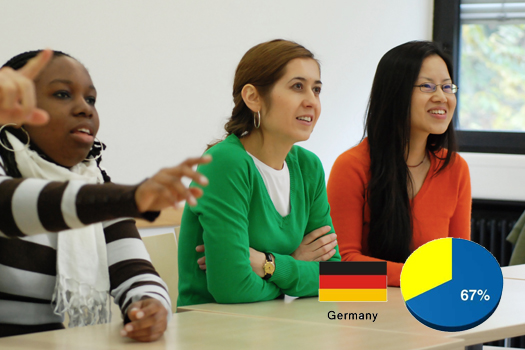Germans aren’t the most polite people in the world and are known to be quite rude and aggressive as people say. The customer service in Germany, for example, isn’t the most friendly and supportive, in contrast to other countries. So don’t be surprised by the locals when you visit Germany.
But have you ever wondered as to why Germans are rude and insensitive? Well, the truth is that Germans are not really impolite; they follow a different approach to politeness. That German politeness is quite fundamental to Germans and is followed quite diligently. When you learn German by taking up a German Language Class in Delhi, you will realize that there are three approaches that the Germans follow:
Using Sie informal situations
In the German language, there are some German pronouns that Germans use to address people. While Du is the informal reference for the word ‘you’, Sei is the formal pretext of the same. So when you are learning some German pronouns that bring out the German in you, all you need you to need to do is identify a formal situation, and then address people accordingly.
Here are some situations where you address people formally in German:
- Meeting someone for the first time
- Addressing an elder person
- Addressing your boss or senior member of the management at work
If you use Du instead of ‘Sie’, it is considered to be offensive in the eyes of Germans. Also, when you’re calling someone by their names, use Sie and not Du. Please, we beg you! Otherwise, you can tighten your shoelaces and prepare to run.
No beating around the bush
Germans don’t have that much time to have a long conversation to understand and discuss your happiness or misery, especially when you’re a stranger. Imagine that you’re lost in the city, and you have no idea where the nearest subway is. If you are bold enough to grab a stranger next to you and start with, “Excuse me, I was wondering if you could tell me ……”, that person will surely think that you’re mad. Instead of starting with a thousand word thesis on how you were wandering in the street and how you got lost, you just need to get straight to the point and ASK. You don’t need to be formal, just be polite and ask straightaway!
Using Subjunctives
Subjunctives are nothing but forms of verbs that describe the grammatical mood of a sentence. These are used to describe states such as emotion, possibility, judgment, obligation, action, and opinion that are yet to occur.
In English, some subjunctives are ‘would’, ‘could’, ‘and were’. For example:
- I wish I could do something.
- I would make it if you’d let me.
- If I were you, I’d stay.
In the German language, the major subjunctives are as follows:
Sein (to be)
Hätten Sie (bitte) noch etwas Wasser?- Would you have some more water?
Haben (to have)
Haben Sie (bitte) noch etwas Wasser?- Can I have some water, please?
Können (can)
Könntest du mir (bitte) helfen?- Could you help me, please?
That is how you address someone in German.
Conclusion
The German etiquette is different from that of people in other countries. If you address someone in Germany, make sure you do it the right way. To be able to exhibit that level of German politeness, learn German from one of the best German Language Institutes in Delhi.




